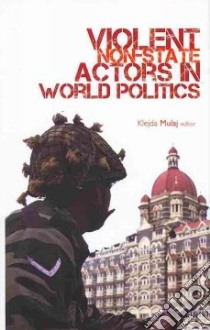Violent Non-state Actors in World Politics - 9780231701204
Un libro in lingua di Mulaj Klejda (EDT) edito da Columbia Univ Pr, 2010
- € 43.90
- Il prezzo è variabile in funzione del cambio della valuta d’origine
"This study of violent non-state actors is of a truly sweeping order that should be appreciated for its profusion of ideas. The individual authors, all experts in their respective fields, lay out the problems of analysis with the fullest respect for their complexity and state their case with remarkable clarity."
Christopher Coker, London School of Economics
"A high quality collection of essays. Case studies are written by leading experts in the field and are consistently fascinating."
Jan Selby, Sussex University
The 2008 attacks on Mumbai were carried out by a Pakistani militant group known as Lashkar i-Taiba, termed a "non-state actor" by Pakistan's president, Asif Zardari. In most cases, violent non-state actors (VNSAs) rise as a state fails, resorting to brutally effective, organized attacks to advance political aims and other goals.
Currently operating in Afghanistan, Lebanon, Somalia, and Sudan, VNSAs can take the form of national liberation movements confronting an occupying force, insurgents engaged in protracted political and military struggles that chip away at a government's legitimacy, terrorists who threaten violence to effect political change, irregular yet recognizable armed forces working within an ungoverned area or failing state, and mercenary militias, such as those used by Shell or army-loaded units operating in the Niger Delta.
The essays in this volume follow the political, economic, and social processes behind the emergence of VNSAs and the way in which they manipulate crises. Contributors isolate the point at which violence becomes desirable to the non-state actor and explore how this change alters the relationship between VNSAs and the state, and they track the influence of VNSAs on the rebuilding of the very governments they tear down. One of the first resources to describe these groups in depth, this volume decodes the internal structure of VNSAs, their recruitment strategies and ideologies their characteristics and partnerships, and their fundamental similarities and differences.
Informazioni bibliografiche
- Titolo del Libro in lingua: Violent Non-state Actors in World Politics
- Lingua: English
- Autore: Mulaj Klejda (EDT)
- Editore: Columbia Univ Pr
- Collana: (Hardcover)
- Data di Pubblicazione: 30 Gennaio '10
- Genere: POLITICAL SCIENCE
- Argomenti : Political violence Non-state actors (International relations Terrorism
- ISBN-10: 0231701209
- EAN-13: 9780231701204


